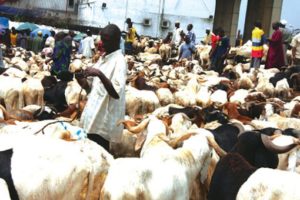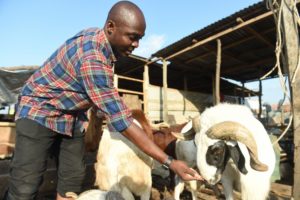 With the naira currency in free fall and inflation soaring, few Nigerians can escape the country’s economic troubles — and that includes Muslims preparing for Eid al-Adha.
With the naira currency in free fall and inflation soaring, few Nigerians can escape the country’s economic troubles — and that includes Muslims preparing for Eid al-Adha.
Livestock traders and buyers said the sale of rams for the annual festival of sacrifice have dropped sharply compared with last year, as Nigerians look to prioritise spending.
“Sales have stalled,” complained Ibrahim Shuaibu, a ram trader at the Hauren Shanu livestock market on the outskirts of Kano, the commercial hub and biggest city in Nigeria’s mainly Muslim north.
“Last year by this time I had sold more than 30 rams but I have so far sold not more than four this season,” he told AFP on Friday, his face sweaty from the scorching sun as he waited for customers.
– Reduced to a trickle –
Animals are slaughtered during Eid to signify followers’ submission to Allah, with the meat shared among family, friends and the needy.
The wealthy often buy several rams to distribute and the run-up to the festival is normally the busiest time of year for livestock traders.
“One person would come and buy 50 rams at once to distribute as gifts to people,” said ram vendor Abubakar Ibrahim, at Kano’s Hotoro market.
“But up till now not a single person has bought five rams at a go from this market.”
Last year, there were more than 500 sales but as of Friday there had only been 20, he said.
Trader Sabiu Ibrahim Hotoro said buyers were coming in “trickles”.
Another, Mudassir Mustapha, predicted: “More than 35 percent of people may not be able to offer a ram sacrifice this year due to the recession.”
Nigeria officially plunged into recession last month after the second successive quarter of negative growth.
The fall in global oil prices has hit the crude-reliant economy hard for the last two years, squeezing government revenue, weakening the naira and forcing up inflation to more than 17 percent.
Foreign exchange has become scarce and investment stalled. This week, the government approved a plan to seek loans from organisations such as the World Bank.
– Prices cut – 
A ram typically costs between 30,000 naira and 70,000 naira ($95-$220, 84-195 euros), depending on size. Traders have slashed prices to attract buyers — but with little effect.
“Rams are relatively cheaper now but lack of money is preventing people from buying,” said Mustapha.
For people like estate agent Babangida Magaji, the price cut has made no difference because of the overall rise in the cost of living.
“The prices of almost everything have gone up with no corresponding increase to my earnings and this gobbles up whatever I would have used to buy a ram,” he said.
“I’ll have to choose between buying food and essential items for my family and paying my children’s school fees or buying a ram for the festival.
“I have to prioritise and buying a ram comes last.”
– Bull sales –
While ram sales have slumped this year, those for bulls are relatively healthy, as some Kano residents look to get round their financial restraints by pooling resources to buy a bigger animal.
“The number of people contributing money to buy bulls to share has gone up and this is due to little cash in the hands of the people,” said cattle trader Kabir Mansur Ashura.
“Our sales have gone up by 20 percent,” Ashura’s brother and partner, Idris, chipped in.
Abdullahi Lawan and three neighbours opted to buy a bull for the feast to save money.
Lawan said he used to buy two rams for the feast. This year he would have needed about 100,000 naira ($285) for the two rams.
But he said: “The quarter of the bull I get at 25,000 naira is more than the meat of the two rams I buy at 100,000 naira put together.
“I lose on the spiritual side for not killing ram for the sacrifice but I gain on the meat. I have no other choice”.








